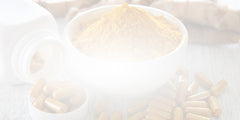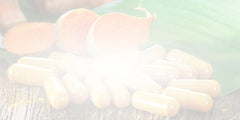
The world is full of interesting and rare plant life and fungi. One of the more useful examples of the latter is the lion's mane mushroom. In addition to being from well outside the borders of the United States, the mushroom itself possesses an extremely unusual physical appearance. However, this odd look has not prevented us from taking advantage of the taste and, more importantly, the medicinal properties of the mushroom. Lion's mane has distinguished itself as a nutritional and health supplement for some time, and we are constantly learning more about how it could change the way we look at modern health.
However, some are curious about the mushroom's capability in combatting less tangible issues like brain fog. Since brain fog can be somewhat difficult to gauge, finding supplements effective for treating it can be equally tricky. With this article, we hope to provide some insight into whether or not lion's mane can successfully serve as a supplement for combatting brain fog.
What is Brain Fog?
Brain fog can be difficult to define, given its relative lack of tangible effects. In fact, brain fog is not even a condition in and of itself and exists almost entirely as a symptom of underlying conditions and will seldom be experienced on its own. It is such a subtle symptom that most people who suffer from it are not even fully aware that they are experiencing it.
Brain fog makes it difficult for you to focus on something at any given moment, akin to conditions such as Attention Deficit Hyperactivity Disorder (ADHD), albeit on a lesser scale. More severe forms of brain fog can negatively affect the parts of our brain that regulate memory and make it hard for us to retain or access our memories.
Brain fog is caused by many conditions and diseases and more mundane causes like a poor diet or lack of sleep. Even excessive stress can induce brain fog. That said, the most prevalent cause of brain fog in us is a result of inflammation, making any disease or condition that triggers an inflammatory response liable to induce the clouded mental state.

Some of the more common conditions that trigger this response include:
- Allergies
- Diabetes
- Psoriasis
- Cardiovascular disease
- Arthritis
- Rheumatoid arthritis
These are far from every disease or condition that causes brain fog; however, they are commonly associated with diabetes and arthritis. In addition, mental health can be a source of brain fog, making it one of the most common symptoms seen in the human body.
When brain fog goes unaddressed, things get to be dangerous. Brain fog can not only make it difficult for you to focus or cause memory issues, but it can diminish your mood, leaving you mentally, physically, and emotionally compromised. This, of course, is why we have sought avenues that can be employed to counteract the negative effects of brain fog and restore us to our old selves. The question is whether or not lion's mane is a viable option.
Recently, we discussed the use of turmeric for the same purpose. However, lion's mane is a very different beast altogether. Hericium Erinaceus is a mushroom native to North America, Europe, and Asia that was used in traditional medicine long before we even knew what brain fog was. However, it has recently been re-evaluated for any potential benefit regarding this problem. So, let us jump in and see how lion's mane interacts with some of the issues known to cause brain fog to better understand how it might serve to fight against it.
Lion's Mane and Inflammation
You will recall that we cited inflammation as a leading cause of brain fog in the human experience. Inflammation in and of itself was meant to be our body's defense mechanism pending its repair of physical injury. However, when we are constantly inflamed, it leads to complications like brain fog and turns into a major detriment to our overall health. This makes finding ways to reduce inflammation an effective tool in fighting back the effects of brain fog. As it turns out, lion's mane might just be the tool we need to do exactly that.
Lion's mane has confirmed anti-inflammatory and antioxidant effects that can easily be used to fight off brain fog induced by inflammation or other oxidative stress. With reduced inflammation, you might find that the effects of the brain fog quickly become more manageable until it fades altogether. If you have doubts about the effect of lion's mane in this regard, there have been several animal studies evaluating the anti-inflammatory properties of the mushroom.

The studies evaluated the effects of lion's mane on inflammation in rats and found that the subjects administered the mushroom saw greatly reduced inflammation. This was done initially to evaluate the mushroom's use as a tool against inflammatory bowel disease and other inflammation-based conditions. However, given brain fog's direct connection to inflammation, it is clear that it could be used for that purpose.
An additional study found that lion's mane has the fourth highest antioxidant activity of any mushroom. As antioxidants are just as beneficial in treating chronic inflammation, this further reinforces its place as a weapon against brain fog. Inflammation, however, is not the sole cause of brain fog and is, generally, a symptom of something else itself. After all, we generally only experience an inflammatory response when our body knows it needs to heal.
Lion's Mane and Diabetes
Diabetes is one of the main culprits behind brain fog, with the latter being a well-known symptom of the former. So, treating diabetes with all available resources could work wonders in managing brain fog symptoms. In that respect, lion's mane once again can shine. Just as it has been attributed benefits in combatting inflammation, lion's mane has been studied with results showing promise in its use as a supplement to treat diabetes symptoms. By extension, this also reinforces its use in combatting diabetes-induced brain fog.
Animal studies were conducted that discovered lion's mane has the potential to reduce overall blood sugar content in mice with diabetes. Dosages as low as 2.7mg per pound were effective in this regard. Lion's mane can accomplish this effect by inhibiting the alpha-glucosidase enzyme, responsible for the breakdown of carbohydrates, and preventing excess blood sugar from building up. This is because our bodies will have a much harder time digesting the carbohydrates and have a harder time absorbing the sugars within.
While this particular effect does not directly relate to brain fog, reducing the blood sugar in the body will reduce the frequency and intensity of diabetes symptoms, brain fog included.

In addition to helping tend to the blood sugar issue and reducing overall symptoms, lion's mane has been shown to address the nerve damage caused by diabetes. Nerve pain induced by diabetes can be excruciating and make it harder still to focus, and can induce brain fog. A study found that a 6-week regimen of lion's mane extract can drastically reduce pain.
Lion's mane is primarily a therapeutic supplement where diabetes is concerned. However, since it can mitigate some of the core causes of diabetes, it could easily serve as a therapeutic tool to alleviate the associated brain fog, which could be significant in ensuring that you can remember the steps you need to take to take care of yourself. However, physical ailments are not the only source of brain fog.
Lion's Mane and the Brain
Another major source of brain fog is mental health conditions like anxiety, dementia, and other mind-affecting conditions. The issue here is that treating mental health requires a gentler touch and a little more oversight than you would for managing certain physical ailments. However, despite the uncertainty behind certain mental health treatments, options are still available that might provide a surprising boost to your mental health. Lion's mane is one such tool for this goal.
One of the most devastating mental issues afflicting the human race, and an indisputable source of memory troubles like brain fog, is dementia. Lion's mane mushroom, however, possesses two compounds that are known to provide something of an edge over conditions like dementia and possibly even Alzheimer's. These compounds are hericenones and erinacines. These compounds are known to promote the growth of brain cells and reinforce against conditions that compromise memory and mental function.
In fact, based on the presence of these compounds, studies have been conducted to measure the effects of lion's mane on memory directly. Animal studies, in particular, showed that mice who consumed lion's mane saw a downturn in the accumulation of amyloid-beta plaques. These plaques cause neuronal damage and memory loss when they buildup in excess, so the stunting of their production indicates how lion's mane can protect the neurology of the human brain. These plaques are especially prevalent in Alzheimer's patients, who frequently suffer brain fog and memory loss.

A human study found that the use of lion's mane boosts the neural function of our brains and minimizes the effects of cognitive impairment. Furthermore, the study showed that as little as 3g of lion's mane daily for four months was all it took to reap these neurological benefits and improve human cognitive function.
When it comes to mental health issues like depression and anxiety, brain fog is a lesser-known symptom that might not manifest for everyone. However, for those who do experience the effects, animal research has supported the use of lion's mane to manage the symptoms of these mental health troubles. It ties back to the anti-inflammatory effects we mentioned earlier since the pain associated with chronic inflammation can cause depression or malaise in general. The study found that reducing inflammation reduced the symptoms of anxiety and depression in mice.
Another study found that lion's mane can outright regenerate brain cells found in the hippocampus. Since the hippocampus is where memory is handled in the human brain, the regeneration of the cells can help reinforce your mind against brain fog. This makes it evident that lion's mane can make a huge difference on a neurological and mental level and a physical one for sufferers of brain fog.
All of this information should serve to illustrate the benefits this mushroom has to offer you in terms of combatting brain fog.
The Nu You
Lion's mane is a powerful fungus that has a lot to offer regarding our physical and mental health. Its ability to interact with and mitigate symptoms for so many serious conditions is nothing short of incredible. We are constantly learning more and more about it as we move forward. Plus, with the recent research, its benefits in combatting brain fog are becoming more obvious to the average consumer. This is not to say that we have a miracle mushroom on our hands, as lion's mane will certainly never be able to substitute for proper medical treatment. However, if you want every advantage against brain fog, it can be a worthy addition to your diet.

Knowing all this about lion's mane is half the battle; the other half is finding a reliable source of the product. To that end, we at NuVitality would like to extend an offer of aid. We sell supplements made with concentrated lion's mane extract so that you can enjoy its full range of benefits with the ease of a simple capsule. In addition to being organic, we use mushrooms grown 100% traditionally. So, if you are interested in seeing if lion's mane can benefit you, check out our website and let us accompany you on the journey to the Nu healthier you.
Do you have any questions about the lion's mane mushroom? Is there anything from this article that you would like a little more clarification on? If so, please feel free to reach out and contact us at any time! We would love to assist you however we possibly can on your journey to newfound health! Additionally, you can also check out our other blog posts, where we talk about lion's mane mushroom in further detail! You can find those posts right over here!






